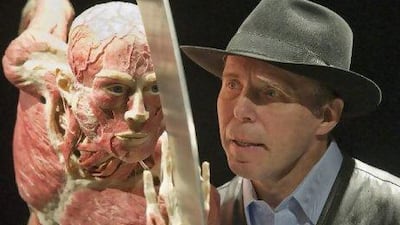BERLIN // Gunther von Hagens, the eccentric German creator of the controversial Body Worlds exhibitions, which feature preserved corpses in poses such as heading a football or playing the saxophone, has announced he is suffering from Parkinson's disease and is preparing to have his own body put on show.
Dr von Hagens, who turned 66 on Monday, said the diagnosis of the degenerative disorder of the nervous system was made two years ago and he has had to reduce his workload because the symptoms are likely to worsen. He expects to remain active in some form for a further seven years.
"My hands tremble, my speech is becoming unclear and slurred. My movements are becoming increasingly unco-ordinated," he told employees at his corpse preservation factory in the eastern German town of Guben last week. "I keep stumbling around like a child."
The anatomist dubbed Dr Death, whose trademark black fedora hat evokes the medical pioneers of the Renaissance, invented and patented the process of preserving corpses through so-called plastination, in which bodily fluids are extracted by vacuum and replaced by plastics such as silicone rubber.
His company says his Body Worlds shows have been seen by more than 31 million people around the world since they were launched in 1995. The exhibitions of flayed corpses with eyes bulging and their internal organs, muscles and tendons exposed have caused outrage and fascination in equal measure.
Some 12,000 people have registered to donate their bodies for plastination and exhibition after their death.
Dr von Hagens is on that list himself, along with his wife and 95-year-old father.
The doctor "wants to greet visitors at the entrance to the exhibition as a plastinated specimen one day", said Peter Kiefer, a spokesman for Body Worlds.
"In future, Gunther von Hagens will try to spend one day a week dealing with production and sales. He will spend the rest of the week writing instructions in order to achieve his last great goal, the development of a digital anatomical teaching platform on the Internet."
Religious groups and other critics of his work have condemned the exhibitions as an affront to the dignity of the dead and as pandering to base voyeurism.
Dr von Hagens has fought off legal challenges and argued that he has been pushing back the boundaries of anatomical science to teach people about the workings of the human body. Some exhibits show the impact on internal organs of diseases such as smoker's lung, cancer and cardiac arrest. Preserved corpses and organs are also sold for medical teaching.
He has courted controversy and often basked in the resulting publicity, performing the first public autopsy in Britain in 170 years in 2002 at a packed London theatre, exhibiting corpses positioned in the act of sexual intercourse, and opening what German tabloids called a "supermarket for body parts" in Guben in 2010 - a shop selling plastinated "slices" of bodies. A cross section of a human head is priced at €1,500 (Dh7,120).
Last June, Dr von Hagens confirmed that he was interested in working with Lady Gaga, the pop singer, to provide corpses as stage props for her concerts.
"We are both committed to aesthetics," he said in a press statement, describing his plastination laboratories as "postmortal beauty parlours".
He even raised the idea of bringing corpses back to life by making them dance.
"Why shouldn't plastinated specimens sing?" he added. "But I could also imagine a room with floating transparent body slices with Lady Gaga dancing around them to great effect, giving the installation a third dimension."
Dr von Hagens said 150 out of 180 employees at the Guben factory would be made redundant as a result of his downsizing. It will be a major blow to the economy of the small town on the German border with Poland.
A spokesman said the redundancies would have no impact on the Body Worlds shows and that other production sites including the Institute for Plastination in the south-western city of Heidelberg and a factory in Dalian, China where animal cadavers are preserved, would also be unaffected.
Dr von Hagens was born Gunther Liebchen on January 10, 1945 and adopted his current aristocratic-sounding surname from his first wife. He grew up in East Germany and spent two years in prison there after being caught trying to defect to the West. He was finally bought free by West Germany in 1970 under a prisoner release scheme, and continued his medical studies.
In his speech to the Guben workforce, he spoke with characteristic openness about his ailment, revealing that he had had two electrodes implanted in his brain to counteract the effects of Parkinson's. "This medical advance has allowed me to function, and optimised my ability to perform daily tasks. When I turn up the power, my tremors cease, but my language degenerates into an unintelligible murmur," he told employees. "When I set the current low, I am able to speak almost normally, but I must sit on my trembling left hand or hide it in my trouser pocket."
He said the device had not alleviated his mounting emotional instability, another symptom of the disorder, which led him to cry "for almost ridiculous reasons" and was forcing him to avoid stress.
The scaling down of operations was necessary because his degeneration was likely to be progressive and would steadily impede his ability to manage a large enterprise, he said.
In his remaining years, he plans to focus on developing a digital anatomical atlas, filing patents for various anatomical techniques he has developed over the years and documenting his research.
"I would also like to create a new body of work reconciling human anatomy and art, a continuation of the work of the Renaissance anatomists that I am calling 'aesthetic anatomy', for exhibitions destined for art museums," he said.

